|
|
Chapter Five: First Attempt To Crash American Market
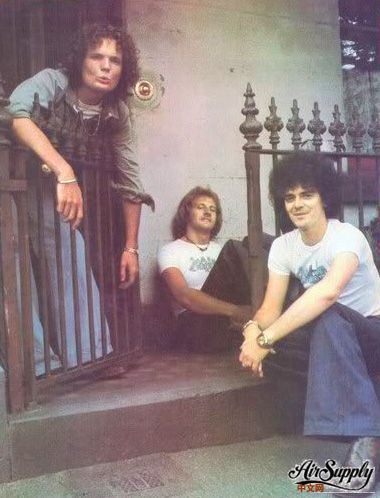
Graham, Russell and Jeremy arrived in L.A. on July 4th, America’s birthday. A CBS Records-supplied stretch limo picked them up at LAX and drove them directly to a back alley at Cherokee Studios in Hollywood. There waiting to meet them was Rod Stewart and his band, and a half empty bottle of champagne. Stewart, who was recording at Cherokee Studios in Studio A, walked up to the limo and gave the champagne to the Australian trio. It was a warm reception for Air Supply, and a suitable prelude to what America had to offer. That night, Air Supply checked into the famous Hyatt on Sunset Boulevard, where Russell stood on his balcony and gazed out over the strip below. “There was this huge billboard on Sunset of Bette Midler,” said Russell. “The air smelled different, kind of sickly sweet, and I looked down and saw black-and-white police cars, which I’d only seen on TV. It was great.” The Hyatt on Sunset was the preferred accommodation for touring rock bands because of its proximity to popular clubs such as the Whiskey a Go Go and the Roxy. Nicknamed the Riot House, it was blessed with a staff that took a lax attitude toward things like guests’ hurling television sets from windows. Air Supply got very little rest at the Riot House, and they would soon discover that Cherokee Studios was very much like the Hyatt on Sunset.
Graham referred to the new record as a “compilation of the first two Australian albums, plus three new songs;” ‘Something You Do,’ ‘Does It Matter,’ and ‘Who Will Love Me Now.’ ‘Something You Do’ was later cut from the album. Russell was apprehensive at first about leaving Air Supply’s band in Australia and using new musicians. “We’re using American musicians and they are so involved with the album. I was a bit pessimistic to start with, about getting studio guys, but they’ve been just so involved and it’s gonna sound great.” The lineup of musicians included Ross Salomone on drums, Geoff Eyrecht on bass, Tony Berg and Rick Lotempio on guitars, and Joey Carbone on keyboards. It was a much different cast of musicians than first planned back in Australia. Producer Jimmy Horowitz brought a tremendous amount of talent to the project, including organ and piano work on a remixed version of ‘That’s How The Whole Thing Started.’
Air Supply was optimistic that their new record would be a success in America, but they were aware how difficult it was to conquer a market 3,000 miles away from their homeland. “It’s great to make it in the music business,” said Graham, “but you have to make it in the States. On this tour, we’ll play to a million people in the next few months, and so the theory goes - if 10-15 per cent of the audience likes you and buys your album, your in good shape. But in Australia, we can go and play on a tour, yet perform in front of only 20,000 and the same percentage still buy the album.”

Hyatt on Sunset Cherokee Studios
Cherokee Studios was an exhilarating and exhaustive place to record at in 1977. There were simply no rules, a prerequisite for some artists. Rod Stewart had gone so far as to cancel his plans to record at Morin Heights’ Le Studio in Quebec, Canada, because RCMP in Toronto had arrested Keith Richards of the Rolling Stones for possession of an ounce of heroin. Stones’ guitarist Ron Wood told Stewart that he wouldn’t recommend recording in Canada because the climate was not safe for a rock artist. So Stewart and Air Supply found themselves at Cherokee. The studio had certainly borne witness to what has given music its well-deserved reputation for ‘sex, drugs and rock-n-roll.’ “It was unbelievable,” says Cherokee owner Bruce Robb. “You could wake up at three in the morning, go into Cherokee and it was the biggest, most exciting nightclub in town. It was around the clock, with the most insane things going on in the rooms. There were two sessions a day in each room; one would stop at eight p.m., the next would start at nine and go until the next morning.”
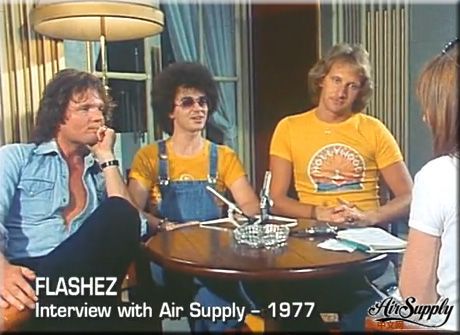
Interview for Flashez in London - July 1977
After three weeks of recording at Cherokee in July, Russell, Graham and Jeremy flew to London, England, for one week to record strings at IBC Recording Studios. They also performed at the annual CBS International Record Conference, in support of Chicago, Heart and Boz Scaggs. They were backed by a group of session musicians including strings. This was a huge achievement for the trio because they were the first Australian band to receive such recognition. Global music conventions were an excellent opportunity for new acts to gain recognition within the ranks of their own label. These conventions hosted thousands of employees from all around the world, plus radio programmers, retailers and vendors. A band that was able to nail a live performance was certainly guaranteed a top priority within the entire company.
Upon arrival in London, Air Supply was quickly ushered into an interview with Australian TV music show Flashez. Flashez had a reputation of going out of their way to promote local Australian acts back home, so it was important for Air Supply to accommodate them. The wear and tear of recording at Cherokee was evident, as all three lads looked tired and jet-lagged.
Peter Dawkins was at the conference in London to represent his first two signings to CBS, Air Supply and Dragon. He hoped to make a favourable impression on the CBS executives, who had requested Air Supply’s presence six weeks earlier. But things could not have gone any worse. According to Dawkins, the trio “stumbled and fell” when it came time to present themselves to the roomful of jaded executives. “By the time we all saw them in London, it was a very sorry Air Supply who took the stage,” said Dawkins. “Following a spectacular set by the Wilson sister’s group, Heart, which Air Supply had elected to do, they had a lot of ground to make up and didn’t. They dried up on stage that night. It was unpleasant for the whole Australian contingent, as it was fairly obvious that this would be the preface to the band being dropped by CBS America.” Rather than embrace Air Supply, the execs said, “We will take Dragon and we will take you [Peter].” Dawkins was promoted to A&R Director for Portrait Records in Los Angeles, a small boutique label run by CBS to develop West Coast talent.
“There were 1,800 delegates there from all over the world,” said Jeremy, “and it was the first time that an Australian band had ever appeared at the concert. But we’d arrived only two days before the gig was due to start and we wandered on stage with an unrehearsed band and string section to boot. I was playing acoustic guitar - consequently we were rather unprepared and it was quite obvious to the audience.”
In early August, just eight weeks before Air Supply’s scheduled tour of North America, the band was blindsided by news that Jeremy Paul was leaving the group. He quite the band in L.A. and flew home to his stone cottage in Sydney’s northern suburb Neutral Bay and to his girlfriend, model Rosemary Wheeler. His departure was described as amicable in the press, but its timing could not have been worse for Air Supply. They had just returned to Los Angeles, the American album was finished and the mixing just beginning to take place. “We just couldn’t believe it,” said Russell. “We could have tried to find someone else but we didn’t want the same thing to happen again. There was nothing to do but put our heads down and continue as a duo.” Graham and Russell thought about taking a short trip back to Australia in September to promote the band, but Jeremy’s departure forced the duo to stay in America to finish the album and prepare for the tour.
CBS insisted that Air Supply sign a three year recording contract in the States, which Jeremy could not agree to. So Bestall & Reynolds paid him off for an undisclosed amount and he returned home. Jeremy’s frustration had been brewing for quite some time, but it was not until the band arrived in London that Jeremy’s decision was actually brought to a head. Naturally, the Australian media could not understand why he left the band when they were all set to make the big time. “You crazy fool,” they all said. “How could you do it, how could you blow such a marvelous opportunity?” But Jeremy’s decision to leave the band was prompted by two things; First, the American album was backed by American musicians, and Jeremy was not allowed to play bass. “We should have been playing on the album,” he said. “But the management’s argument (Billy Gaff’s organization) was that they wanted the best musicians available for our first American album. So we were stuck up front and backed by American musicians. My major problem was that it was no longer a band as such, but just a group of experienced musicians playing together. As far as the concept of a band goes, it just didn’t work out.” Second, Jeremy was forced to play acoustic guitar at the CBS conference in London. “I found myself onstage for the very first time ever playing acoustic guitar and I didn’t like it. I felt as though I was just an added extra to the band, a third person there for the sake of appearances only. I just couldn’t get off on acoustic guitar. I was no longer stimulated, and felt I couldn’t get my teeth really stuck into anything. So one night I got absolutely blind drunk and talked the whole thing over with the management and Graham and Russell, and decided to quit. It was really a matter of taste - I’d think something was a good idea and they usually didn’t agree. I didn’t really see eye to eye with them, so I was better out.”

Graham Russell, Russell Hitchcock, Jeremy Paul
“I have absolutely no regrets about my decision,” said Jeremy. “It was, above all, for purely selfish reasons. You could say I began to have my doubts about my part in the band soon after ‘Love And Other Bruises’ became a hit. It was a phenomenal success and as soon as it had sold 40,000 copies and become a double-gold LP, the business deals started taking place. Suddenly we found ourselves in the middle of a big machine which virtually dictated the way we lived, even how we looked. Every time we started to do something, it was interrupted by another business deal. We became pawns in the business game of rock ‘n’ roll. Air Supply quickly changed from a band of musicians into a business deal, a saleable product. Worst of all was the fact that we’d turned into just another promotional object for the recording company. The whole thing just became uncreative and wasn’t satisfying me. The [American] album was really good. I felt absolutely ecstatic about it and that’s what made the decision really difficult.”
Ultimately, Air Supply’s chances of breaking into the American market would rest on the voice of Russell and the songs of Graham. On stage, the band was at its best when Russell sang lead. “We sat down and formed a three-year plan of action,” explained Graham. “But Jeremy wanted to do other things. He couldn’t make that commitment to us. Plus, he was not really excited about going to the U.S. [to start with]. He had his thing going on in Sydney. His girlfriend, Rosemary, who he later married. He was not excited about leaving Sydney at that particular time, so he left.”
Jeremy wanted to revive his solo career, and already had over 40 songs on the books - Some of his own and some that had been written by others. He planned to release a single in December, a ballad written by his friend (and former Soffrok band member) Rick Turk, which Jeremy believed had enormous commercial potential. “The treatment will be somewhat similar to Boz Scaggs’ ‘Georgia,’” said Jeremy. “It’s got a catchy line and a good beat and I think it should do well. I’m going to be recording again and financing it all myself. The last thing I’ll do is sign another 3 or 5-year recording contract with any company.” Jeremy’s solo career never materialized, but he later accepted an acting role in Reg Livermore’s 1978 production of Ned Kelly and had a few film offers.
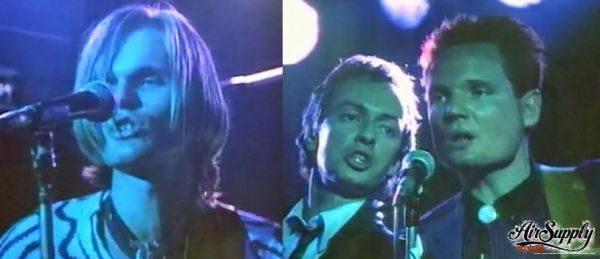
Divinyls - Mark McEntee, Bjarne Ohlin, Jeremy Paul
In 1980, Jeremy joined a band called Baton Rouge, which included singer Chrissy Amphlett. Soon after, they formed a band called Divinyls with former Air Supply guitarist Mark McEntee. Divinyls were quickly signed to WEA Records, then scored a smash hit in Australia called ‘Boys In Town.’ But Jeremy was fired from the band because he had tried to replace Chrissy Amphlett with an actress named Kim Deacon. Divinyls manager, Vince Lovegrove, wrote about the incident in the book Pleasure And Pain My Life; “Jeremy was ousted because of his lackluster bass playing, and also because he was trying to get rid of Chrissy who, as anyone could see, was the band’s strength. They were at each other’s throats because of conflicting ambitions and because of Chrissy and Mark’s resentment at the way he had handled the publishing deal with Castle Music. Jeremy got a cut for just three songs, but they were the best three, including ‘Boys In Town.’ All of this bad blood made sacking Jeremy my business and I did the deed at a band meeting at my place in Bondi Junction. He took it very badly. He really thought he was the strength of the band because until I came along he basically managed Divinyls and looked after their bookings. In my opinion, Jeremy quite clearly was a legend in his own lunchtime because he’d been in Air Supply.”
When recording wrapped up at the end of August, Graham and Russell met up with band members for the tour ahead, including some familiar faces; Rex Goh and Robin Le Mesurier on guitar, Nigel Macara on drums, Joey Carbone on keyboards and Howard Sukimoto on bass. Le Mesurier got the job through his association with Billy Gaff, and had worked as a guitar tuner and road manager on the Rod Stewart/Air Supply Australian tour. Rex Goh worked with solo artist Leon Berger in Australia after Air Supply went to the U.S. in July, but he jumped at the opportunity to tour North America with Air Supply.
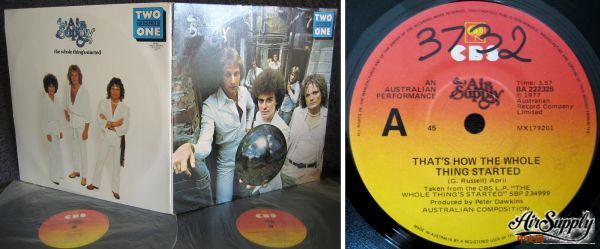
Repackaged Double LP & 'That's How The Whole Thing Started' Single
In Australia, CBS released the next single, ‘That’s How The Whole Thing Started’ (BA 222325), in October. Radio mostly ignored the song and it failed to chart. Air Supply’s popularity in Australia was dwindling, and much to the disappointment of Peter Dawkins and CBS Australia, the band was not around to promote their Aussie LP. Instead, they were in the U.S. preparing to promote their forthcoming American LP. In an attempt to sell more records, CBS Australia repackaged Air Supply’s first two albums and released them as a two-for-one double gatefold album (241031).
On October 1, the Rod Stewart/Air Supply tour kicked off in Vancouver, Canada, at the Pacific Coliseum, which coincided with the release of Stewart’s new album titled ‘Foot Loose & Fancy Free.’ The release date for Air Supply’s new album was still undetermined. It was Stewart’s first tour in North American as a solo artist, and he was rather nervous about touring America with a new band. So, he made North America the final leg of massive worldwide tour that began in Europe. “We wanted to get as far away from everybody as we could [for our first show],” said Rod. “We’d have played Siberia if we could. We ended up in this tiny little fishing village in Norway. The last time I played Vancouver was with The Faces. This is all new and I’m really nervous. The concert is sold-out and I hope people appreciate the effort made to put the stage together.”
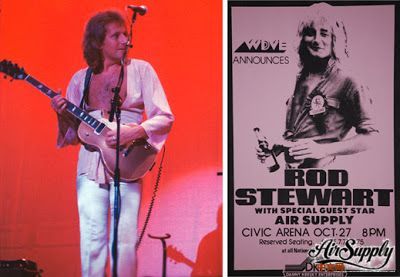
Graham: Vancouver, Canada Oct 1, 1977 (Courtesy Ron Vermeulen)
Air Supply opened the Vancouver concert with a 30 minute set. They were dressed in white, matching the ground breaking design of an all white production - backdrop, borders, curtains and equipment. The large white curtain was removed after Air Supply finished their set, to reveal a massive stage, centered around a large gong bass drum. A large touring party of 47 people was required to make the show happen - including Stewart’s manager, a tour photographer, a publicist, a tour manager, a road manager, a seamstress, a make-up and wardrobe assistant and a masseuse. The working crew, who were responsible for sound, lighting and staging, consisted of 22 people who travelled in two customized buses. The band members and related personnel travelled between cities in either a customized Vickers Viscount turboprop airliner or a Convair 880. Each plane was fitted with two televisions so that Stewart could watch video cassette tapes of month-old Scotland soccer games. The entire entourage arrived at each town around 4 p.m., checked into the local Hilton hotel, then went to the venue for a sound check. They returned to the hotel for a light supper, then headed back to the venue for the evenings performance. After the show, Air Supply and Stewart’s entourage had a late dinner at the hotel or at a restaurant. They went to bed late, woke up around noon, then packed and boarded the plane for the next town and same routine.
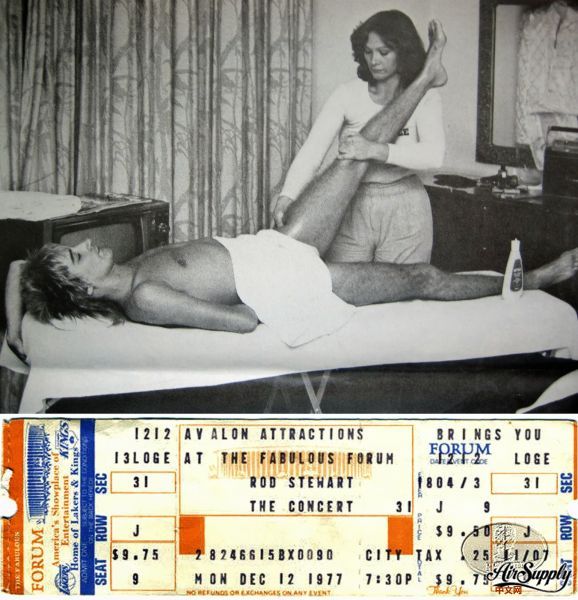
Rod Stewart/Air Supply North American Concert Itinerary
October
1. Vancouver, British Columbia, Canada - PNE Coliseum
2. Seattle, Washington - Center Arena (Rescheduled to October 3 due to lighting accident)
4. Portland, Oregon - Memorial Coliseum
6. Calgary, Alberta, Canada - Stampede Corral
7. Edmonton, Alberta, Canada - Edmonton Coliseum
10. Montreal, Quebec, Canada - Montreal Forum
11-12. Toronto, Ontario, Canada - Maple Leaf Gardens
14. New Haven, Connecticut - New Haven Coliseum
15. Largo, Maryland - Capital Centre
17. Buffalo, New York - War Memorial
18. Philadelphia, Pennsylvania - Spectrum
20-21. New York, NY - Madison Square Garden
23-24. Uniondale, New York - Nassau Veteran’s Memorial Coliseum
25. Providence, Rhode Island - Civic Center
27. Pittsburgh, Pennsylvania - Civic Arena
29. Lexington, Kentucky - Rupp Arena
30. Indianapolis, Indiana - Market Square Arena
31. Chicago, Illinois - Chicago Stadium
November
2. Saint Paul, Minnesota - Saint Paul Civic Center
4. Richfield, Ohio - Richfield Coliseum
5-6. Detroit, Michigan - Cobo Arena
8. Cincinnati, Ohio - Riverfront Coliseum
9. Roanoke, Virginia - Civic Center
10. Charlotte, North Carolina - Coliseum
19. Birmingham, Alabama - Civic Center
20. Atlanta, Georgia - The Omni
21. Jacksonville, Florida - Coliseum
23. Hollywood, Florida - Sportatorium
25. Baton Rouge, Louisiana - Louisiana State University
26. Houston, Texas - The Summit
27. Fort Worth, Texas - Tarrant County Convention Center
29. Kansas City, Missouri - Kemper Arena
30. Oklahoma City, Oklahoma - The Myriad
December
2. El Paso, Texas - El Paso County Coliseum
5. Denver, Colorado - McNichols Arena
7. Tempe, Arizona - ASU Activity Center
8. Tuscon, Arizona - Community Center Arena
9. San Diego, California - Sports Arena
12-14 Los Angeles, California - The Forum
18-19. San Francisco, California - Cow Palace
“The Rod Stewart tour was 48 dates in 70 days - very tiring,” said Graham. “But it was great. Tremendous groundwork for us and terrific exposure. I think we made the most of it. We never had a bum night. It’s frightening when you go out and see 20,000 people. When you’re facing that sort of audience, you know you have to play well, and you do. The highlight was Montreal. The crowd went crazy for us as well as Rod. We watched him every night and took in how he worked the stage and interacted with the audience. And we spent a lot of time with him. We’d sit and have tea. Rod always loves a cup of tea and a KitKat candy bar at four in the afternoon we discovered. He would tell us stories. He was incredible, and I can’t speak highly enough about him.”
“What we wanted to do through the Rod Stewart tour was to present Air Supply to as many people as possible,” said Russell, “and see if we could make any impression on them. We played to more than 900,000 people, so we succeeded in our first aim. The reception was much better than we all anticipated, so we think we made some impression. After all, we were playing to audiences who had never heard of us, and opening for a famous entertainer like Stewart, who is much rockier than us.”
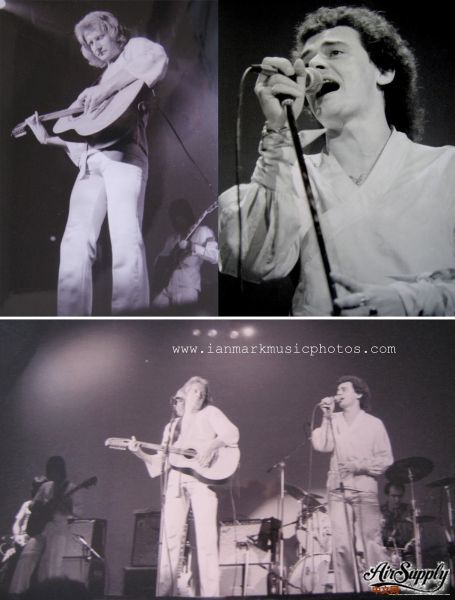
Calgary - Oct 6, 1977 (Photo: Ian Mark)
The American media agreed with Graham and Russell’s assessment:
The opening act was Air Supply, a new seven-man band whose members come from Singapore, Australia, England and America - a truly international group. Air Supply’s music is pleasant, straightforward rock, simple and energetic. The lead singer is very good. The group’s first album is due out very soon, and if their concert appearance is any indication, they will be a name we’ll be hearing a lot more of in the coming years. - The Beaver Times
Hitchcock, particularly, had a rangy, compelling voice capable of handling Russell’s strong melodies with ease. Group plays very well as an ensemble; there are no individual heroes. General vein is pop-rock somewhere between Pilot and Foreigner. Air Supply succumbs to common error of performing all original material, totally unfamiliar to audience. One or two outside contributions would have strengthened the set. - Variety Magazine
A music critic in Calgary, Canada, who gave a scathing review of Rod Stewart’s performance at the 7,500-seat Stampede Corral, was more appreciative of Air Supply:
Appearing with Stewart was Air Supply, a rock ‘n’ roll outfit from Australia that are relatively unknown in this country. They offered a selection of original material which may be in contention for radio play someday, but now serves to keep the band in a kind of rock ‘n’ roll limbo, as they resist the temptation to perform better known material by other artists, thereby running the risk of being labeled as accomplished imitators.
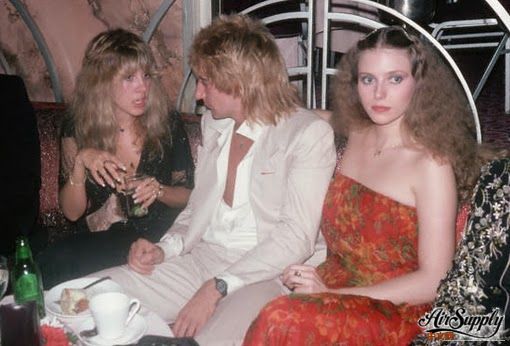
Stevie Nicks (Left), Stewart & Bebe Buell at Regine's
A highlight for any band is the opportunity to play Madison Square Garden. Air Supply did just that - twice! To celebrate the occasion, Rod Stewart and Warner Bros. Records hosted an extravagant after-show party on Friday night (October 21) at top night spot Regine’s on Park Avenue. The party, which cost a five figure amount, was invitation only. Amongst the celebrities in attendance were John Lennon and Yoko Ono, Woody Allen, Diane Keaton, Robert Palmer, Stevie Nicks and Dan Ackroyd. “We played MSG two nights.” said Russell, “The second show was great. In the afternoon, at the sound check, I stood on the stage and looked at the empty Garden and thought ‘Wow, I’m really here,’ but when we were playing that night we were too busy for anything but concentration on what we were doing. The stage lights only let you see the first few rows, so we could have been anywhere. But the party afterwards at Regine’s was great.”
Air Supply made the most of their time in America, taking in all the excitement and temptations that large cities like New York, Atlanta, and L.A. had to to offer. “When we first came over here in 1977, it was parties every night,” remembers Russell. “You know, see who could drink the most and not fall over. I’m generally a very organized person, but on that first tour we were supporting Rod Stewart [in Australia], I had only been in the band for four months at the time. And that was my first band ever. Can you imagine what I went through emotionally? I was doing everything going. There are, I guess, four or five months in 1977 that I don’t even remember. I got introduced to Tequila on that tour, and I drank lots and lots of it. [But] drugs were never in our curriculum. I’m terrified of stories that I’ve heard of people that I know very well getting into heroin or something. That scares me so badly it puts everything else beyond my curiosity.”
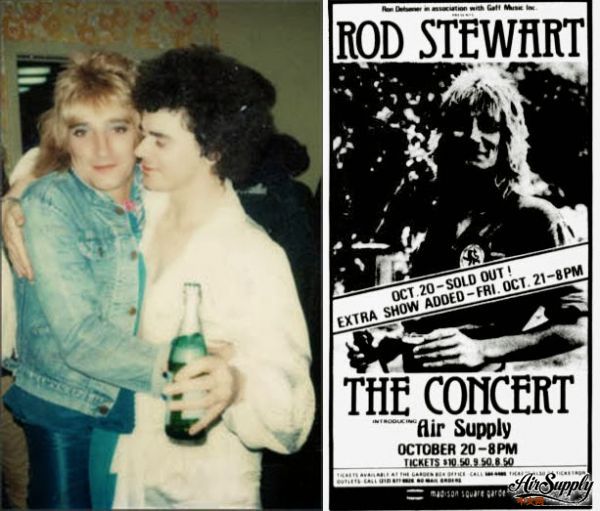
Rod & Russell Backstage MSG October 20-21
“Neither of us have ever been monks,” said Graham. “We used to get pretty wild in the early days, but we just don’t tell anybody about it. Nothing in particular, but everything in general. We never got into drugs, and I think that was a smart move for us. It wasn’t our thing. It might sound schmaltzy, but we’re very family-oriented. I would really hate it if my folks thought poorly of me. I really appreciate what they did to put me through school.”
Despite living the rock and roll lifestyle, Air Supply avoided negative press in North America. Graham and Russell insisted that band members treat everyone and everything with respect. “We’re quite severe with the people that work for us,” said Russell. “They’re not allowed to mess around or steal towels or pinch things, any of that stuff - or they simply don’t work for us anymore. They’re told straight off, ‘No one messes rooms!’” Of coarse the opposite was true with Rod Stewart’s entourage, where ‘redecorating’ hotel rooms was encouraged.
Stewart and his many band members had a long history of bad behavior. For the second time in three years, members of Stewart’s band demolished a Florida hotel room. Two of the musicians, who had been drinking quite heavily, were arrested for tearing the ceiling down, throwing a lamp through a window, defacing the walls, shredding curtains and tossing around a TV set. The incident made all the local newspapers, but according to one source, the real reason for the arrests was never disclosed. Apparently, Stewart’s band and road crew grew increasingly frustrated with Air Supply manager Fred Bestall. Bestall had developed a reputation during the tour of accepting free drinks at the bar, then quickly disappearing when it was his turn to buy a round. Stewart’s tour manager had seen enough, and in the hotel’s private lounge, he roughed up Bestall. While the bartender fled, Stewart’s alcohol-fueled crew joined in and tossed a near-unconscious Bestall over the bar. When local police arrived, there was some confusion over who started the fracas, but Stewart’s tour manager was arrested later that evening.
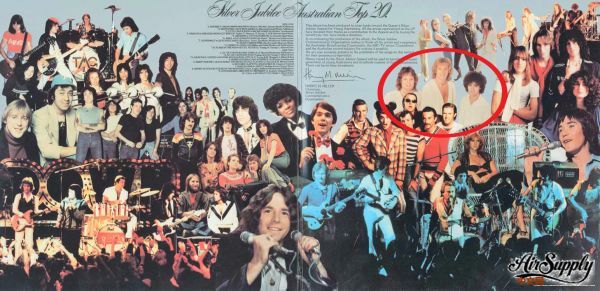
Gatefold Album Cover of ‘Countdown - Queen’s Silver Jubilee’
In November 1977, Air Supply was one of twenty musical acts to be included on a limited edition album, titled ‘Countdown - Silver Jubilee Australian Top 20,’ commemorating 25 years of Queen Elizabeth II’s reign. Harry M. Miller and the Australian record industry collaborated to produce the 20-track album, featuring some of the most popular Australian musicians at the time. Proceeds of its sale went to the Queen’s Silver Jubilee Appeal for Young Australians, funds to be distributed in the form of grants or awards to help young Australians. Several record companies, and all the artists, songwriters and publishers involved donated their contributions. The gatefold cover of the double album featured a Sergeant Pepper’s-style collage of stars of the 70s - Sherbet, Skyhooks, Air Supply, Dragon, AC/DC, Ol’ 55, Richard Clapton, Marcia Hines, Jon English, John Paul Young and Supernaut. The album was produced and promoted through ABC’s Countdown, and was officially launched by Prince Charles in an episode that aired November 13, during his visit to Australia to mark the Silver Jubilee. While the album included an impressive list of Australian artists, the song selection left much to be desired. Many of the songs are throwback album tracks and obscurities, including ‘It’s Automatic’ by Air Supply, which was never released as a single.
When Billy Gaff’s management team developed a plan to help Air Supply break into the U.S. they intended to concentrate heavily on television work. But it was not until December 9, when the tour was almost done, that Air Supply made their North American TV debut. They appeared on the The Midnight Special, a musical variety telecast on NBC, which followed The Tonight Show with Johnny Carson on Friday nights. The show had a good reputation among music critics because the performances were mostly live and not lip-synced like many shows during the late 70s. Air Supply performed ‘Feel The Breeze’ and ‘Do It Again.’
The same night that Air Supply performed on The Midnight Special, the first Australian Rock Music Awards took place in Sydney at the Hordern Pavilion. Awards were handed out in 28 categories, and the winners were chosen by hundreds of people involved in the music industry, including journalists, radio announcers, record-company executives and promoters. Air Supply was nominated in two categories: Best Recording Group, won by Little River Band, and Best New Rock Act, won by Dragon.
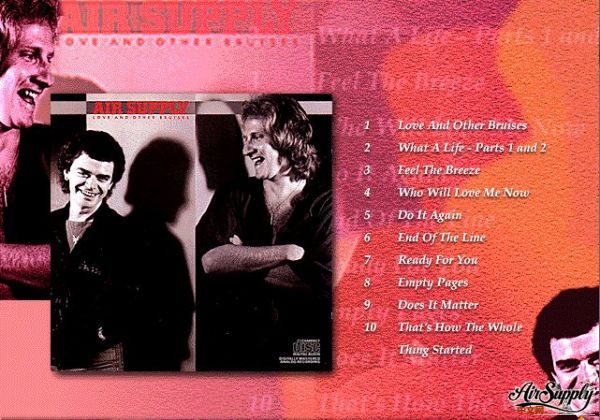
Columbia Records released Air Supply’s third album, ‘Love And Other Bruises’ (JC 35047), in early December. It was re-issued by Columbia in 1981 as one of the labels ‘Nice Price’ collection (PC 35047), which sold more copies than the original release.
Reviews of the album were mostly positive:
A creditable U.S. debut by this Australian duo, who are currently touring with Rod Stewart. This collection offers predominately mellow, acoustic pop ballads, guitar and keyboard dominated with subtle string and horn blending. The vocals are reminiscent of the Brothers Gibb’s tentative, waivery quality, and are most effective on the love songs. Best cuts: ‘Love And Other Bruises,’ ‘Do It Again,’ ‘Ready For You,’ and ‘Feel The Breeze.’ - Billboard
‘Love And Other Bruises’ spawned two North American singles; ‘Do It Again’ (C4-8217) and ‘What A Life.’ Neither song charted. Epic/Sony Records, a division of CBS, released ‘Love And Other Bruises’ (25 3P-295) in Japan with different cover art, but identical track listing to the U.S. release.
The North American tour ended on December 19, with two shows at the Cow Palace in Daly City, California, where Stewart slipped on a flower lobbed by a fan onto the stage, causing him to trip and land face first on the drum riser. He lost a tooth and required seven stitches. This was a fitting way to end the tour, because on just the second date of the tour in Seattle, the show had to be postponed after four crew members were injured when a cable broke while they were hanging lighting equipment. The travelling up, down, across and around America was hard on everyone, but especially a lead vocalist. About half way through the tour Russell collapsed on stage due to exhaustion. “The throat’s lasted very well, considering,” said Russell. “Somebody told me what the trick is - as soon as you get into your hotel, you turn off the air conditioning. It’s been hard, very hard work. It’s nearly finished. We’ll be back in Australia just before Christmas. Collapse for a while then start rehearsing for an Australian tour, probably in February. Graham’s had very little time for himself, but he’s used what he could get very productively. Even been writing songs.”
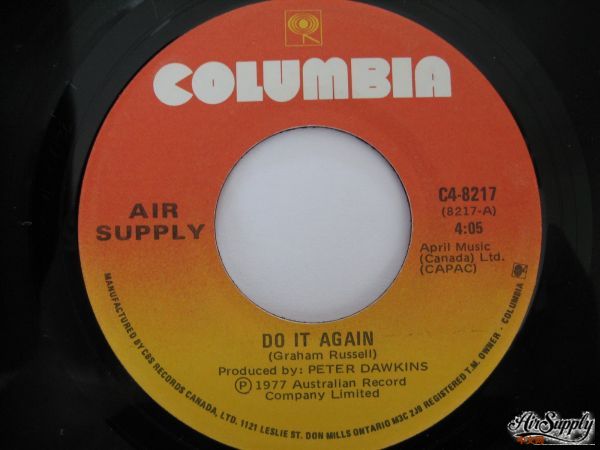
‘Do It Again’ - Canadian Pressing
Despite the injuries, arrests and damaged hotel property, the tour was considered a smashing financial success for Stewart and his promoters, who grossed more than $6 million. Air Supply, like most opening acts, were not as fortunate. “We learned how to go into debt,” said Russell. “We lost a lot of money on that tour. No professionalism. But as we toured with Rod, we learned real professionalism. We just wanted to learn from him, and his management, and his crew - we were right beside the stage, every night, watching every aspect of his concert. Obviously, we’re an unknown band here, but the tour and things like appearing on the Midnight Special TV concert, and possibly Don Kirshner’s in Concert as well, have helped a lot.”
Air Supply flew back to Australia. Despite making valuable contacts in North America, and continued interest from Billy Gaff, visa limitations meant they had to return home. When asked about the band’s future in America, Russell said, “The feelers are already out for a tour with another big name when we return to America. While we were on the Stewart tour, Elton John was mentioned. But that seems to have faded since John announced he doesn’t want to tour anymore.”
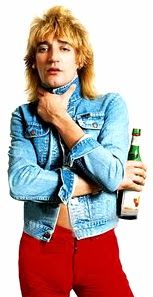
When flying back to London, Stewart and his seven-man entourage held a noisy in-flight party, which resulted in many complaints from other passengers. When the dust had settled, the first class cabin was littered with cigarette butts, damaged seats, bottles and other debris. Holding a large glass of brandy and stepping off the plane with his arm around an attractive girl, Stewart said, “I can’t make any excuse for what happened. All I can say is we’ve been touring for a year and something had to give.” In his book titled Rod: The Autobiography, Stewart talked about how the partying did not end after he stepped off the plane; “I finished doing up my boots and strolled off the plane and into Heathrow Airport, as naturally as a man can when his footwear has been filled with assorted airplane catering items. Apparently I was still holding a glass of cognac and singing Jolson’s ‘Mammy’ when I reached the baggage collection area. But even then, surely, the realization was downing on me that this time we had gone too far. Certainly the sight of Jim Cregan, my guitarist, his curly hair full of ash and cigarette butts and his face smeared with what seemed, upon closer inspection, to be honey, would have been a decent clue. And the laughing was definitely about to stop because Jimmy Horowitz, from the management team, was shortly to be arrested in the airport’s precincts for public drunkenness. (Apparently having taken a ride on the luggage conveyor belt). Behind us lay a British Airways first-class cabin liberally redecorated with mustard. And ahead of us lay a rightful bashing in the press for our disgraceful behavior.”
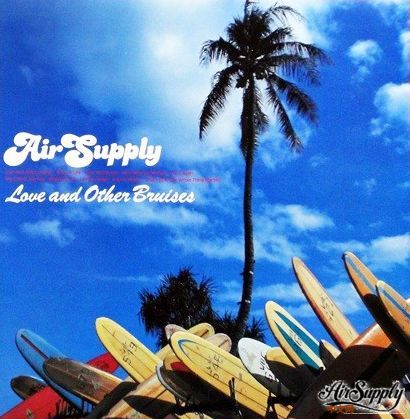
Love & Other Bruises - Japan
During their tour, Air Supply admitted, response from American audiences ranged from indifference to acclaim. They certainly did not conquer the U.S., but their name was at least established in the world’s biggest market. ‘Love And Other Bruises’ was a commercial failure. In the end, it wasn’t the breakthrough album that Air Supply needed and Columbia demanded. It sold just 40,000 copies, a dismal number for a major U.S. record label. Most of those sales came from areas in the States where it had the benefit of radio airplay. Columbia distributed large quantities of the album to retailers, but many of these were returned to the label and later sold as heavily discounted cut-outs (Bargain bin). The band was not paid royalties on cut-outs and promotional records.
According to Peter Dawkins, Air Supply’s American tour and album were a disappointment because they had lost talented musicians in Australia, and their management team lacked experience. “They decided to shed their drummer, keyboard player and guitarist and picked up an American rhythm section,” he said. “This would have been fine had they not had two of the potentially greatest players to ever come out of Australia. The guitarist was Mark McEntee, who later became one great half of the Divinyls, and keyboard player, Adrian Scott, was to become the chief demonstrator for Roland Keyboards. The recording [of ‘Love And Other Bruises’] had taken place all across the globe. Rhythm section in Los Angeles, vocals in Nashville, rounding up with strings in London and mixed God knows where. The results, as you would expect, were disastrous. The tour was also a washout, inasmuch as their management team of Bestall and Reynolds was too inexperienced for the cunning of Stewart’s team. Consequently, the boys played the fifty dates in half empty houses, as they were placed on the bill far too early for the punters (customer or patron) to see them.”
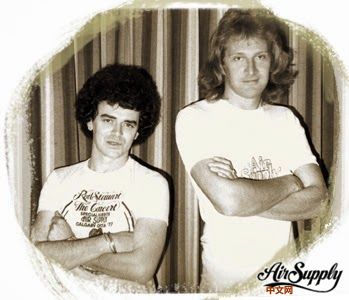
Columbia Records was also at fault, and made several mistakes which contributed to the albums demise. First, the December release was poorly timed because the market was already saturated with new pre-Christmas records from major artists. Records from Jackson Browne, Joni Mitchell, Roberta Flack, Donny & Marie, Kool & The Gang, ZZ Top, Aerosmith and Air Supply were all released the same week, making it an extremely competitive marketplace. Many labels went so far as to postpone the release of certain albums, such as Abba and Manhattan Transfer, until after Christmas to gain a competitive edge. Second, when Jimmy Horowitz had gone to Australia to meet Air Supply and negotiate the Rod Stewart tour deal, it was decided the U.S. album would be released before the start of the American tour. When the album hit store shelves near the end of the tour, it was too late. Third, CBS President, Dick Asher, had begun curtailing the use of independent promoters. These promoters were freelance record pluggers who got Top 40 radio to play certain songs, and only the most successful labels could afford their service. CBS Records, the largest record company in the world, outspent all other labels on independent promoters. By 1977, it often cost $100,000 to hire a top promoter for one pop song. CBS chose not to promote Air Supply’s album with the same vigor as some of their other acts. A year later, Dick Asher went about four months without paying independent promoters, and CBS suffered a massive drop in sales and airplay.
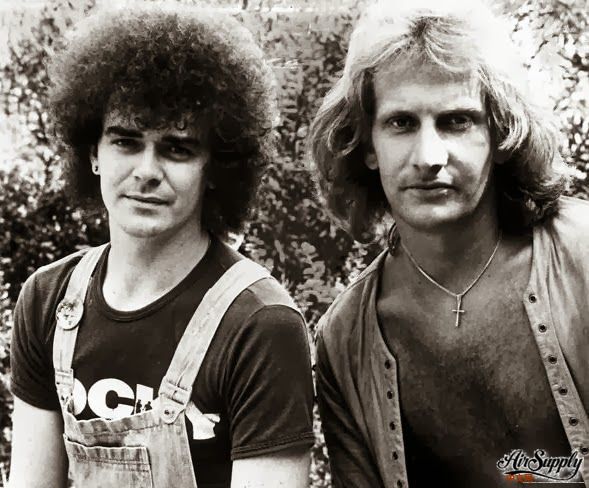
Air Supply and their American record label failed to learn from mistakes made by other Australian acts who came to the U.S. Poor planning in America allowed the enthusiasm and radio play for Sherbet’s album, ‘Howzat,’ to peak before the record was released there, and a golden opportunity for a breakthrough quickly disappeared. The Skyhooks six-month tour of the U.S. was meant to establish it by word-of-mouth. But the tour achieved comparatively little, because the band failed to realize that the way to American acceptance was primarily through hit records. Their popularity in Australia, which was at a peak before leaving, slumped significantly.
“It was such a disappointment when everything stopped after the tour,” says Russell, “because it was the perfect opportunity. The tour didn’t help from a records-sold point of view. Our record company released our album about a month and a half into the tour, and missed all the major centers. Imagine that - being on such a big tour with no album or single for the fans to buy. Columbia blew it. What a wasted opportunity. You know, we always say that the album escaped. It was never released. No one knew about it.” Russell was also disappointed that the band’s first big Australian hit, ‘Love And Other Bruises,’ was not released in America. “It’s my favourite song, and according to many others in the industry, the best thing we have ever done. But our record company owns the rights to it, and it’s up to them to release it should they wish.” |
|